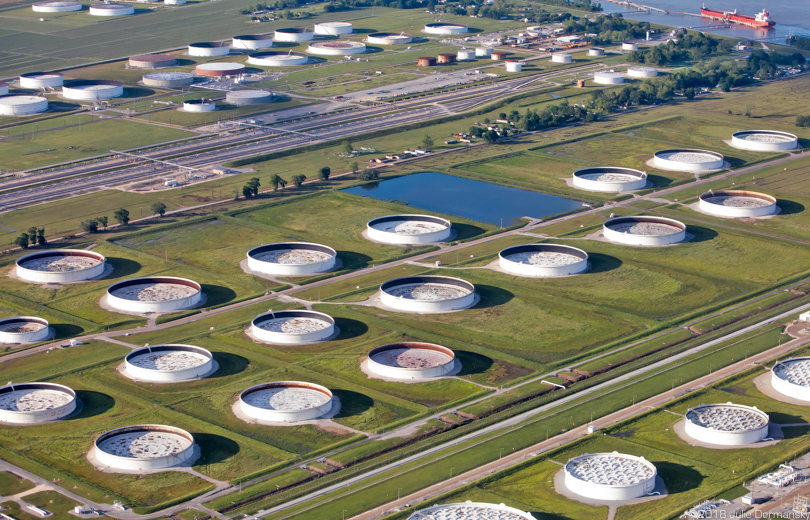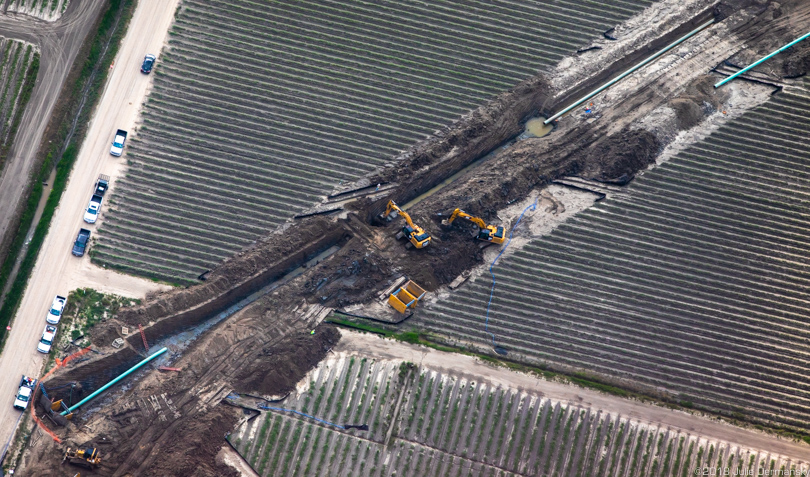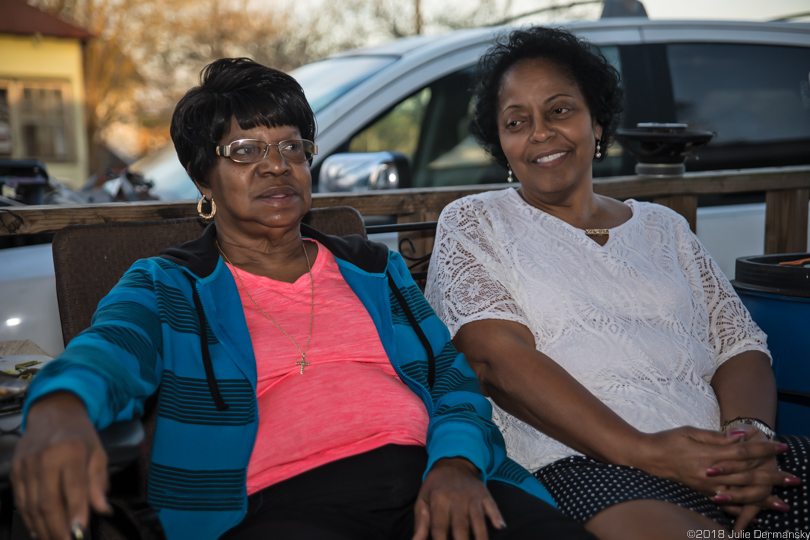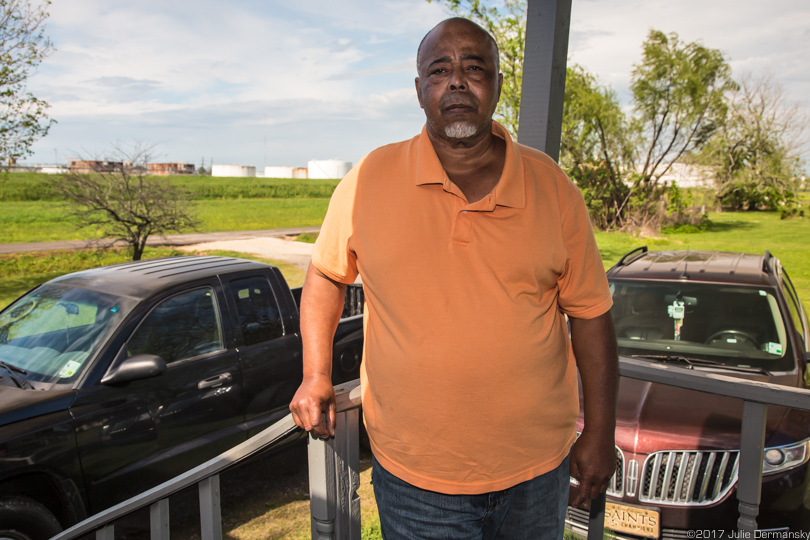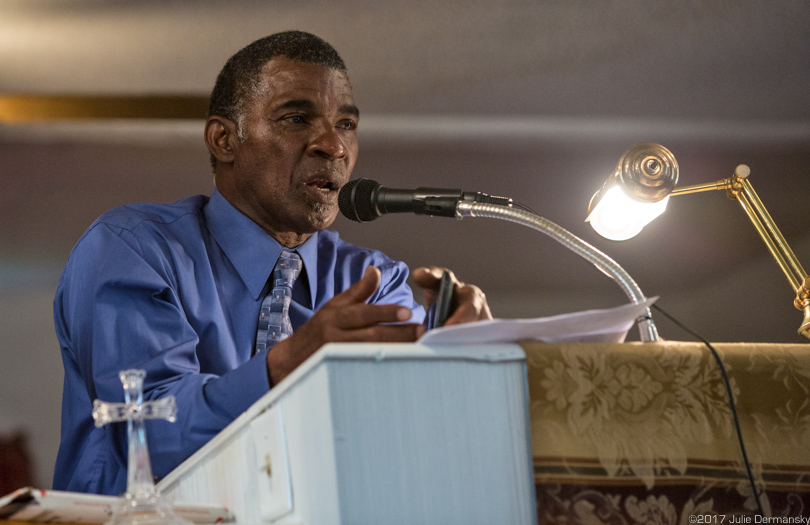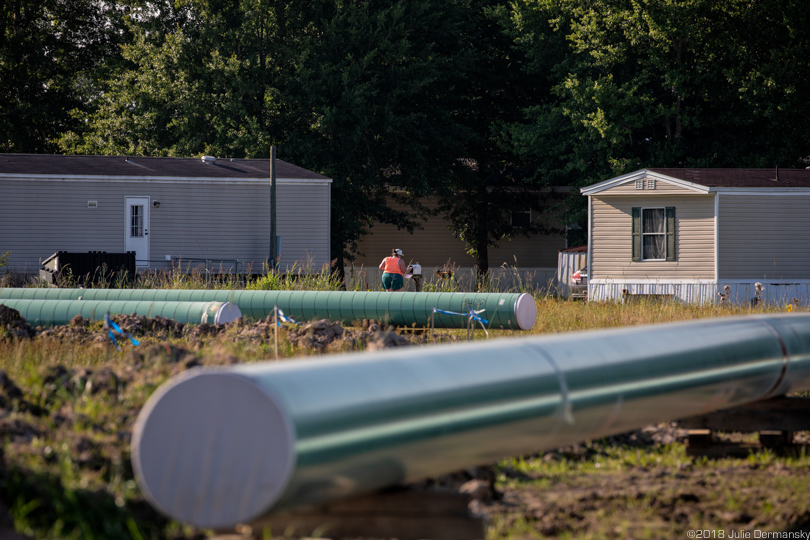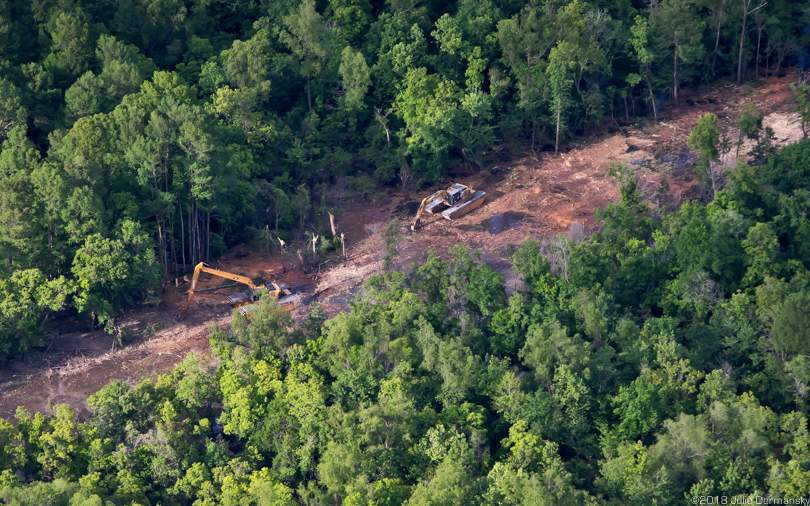A Louisiana judge ruled that state regulators violated guidelines when they issued a coastal use permit to build the Bayou Bridge pipeline in the town of St. James. The judge’s decision, made on April 30, could halt construction of the final 18 miles of the pipeline, which is part of a network carrying fracked oil that begins with the Dakota Access pipeline.
Bayou Bridge Pipeline LLC, a subsidiary of Dakota Access owner Energy Transfer Partners, began building the pipeline earlier this year despite multiple legal challenges. The pipeline is slated to stretch 162.5 miles, from Lake Charles, near the Texas border, across southern Louisiana to a railway terminal in St. James, a predominantly low-income African-American community.
Located in a highly industrialized stretch of land along the Mississippi River known as Cancer Alley, St. James has seen a burst of activity in recent years as oil storage tanks, chemical plants, and a railway terminal moved into this largely rural town.
Construction of the Bayou Bridge pipeline in St. James, Louisiana.
Reduced to a single road into and out of the community, residents along the Mississippi River in St. James would have no way to evacuate in case of an explosion or other emergency stemming from a pipeline failure.
This vulnerability played into Judge Alvin Turner, Jr.’s decision to side with the plaintiffs, which include St. James Pastor Harry Joseph, the Gulf Restoration Network, Atchafalaya Basinkeeper, and H.E.L.P. (Humanitarian Enterprise of Loving People). Represented by the Tulane Environmental Law Clinic, the plaintiffs claimed that the coastal use permit issued by the Louisiana Department of Natural Resources (LDNR) was illegal because the agency did not adequately consider how an emergency could affect the community along the pipeline.
“The permit application does not include an emergency response plan nor does it address potential spills that may occur after construction once the pipeline is operational,” reads the judge’s decision. In addition, LDNR did not consider the potential pollution, noise, and traffic the pipeline would contribute to the St. James community.
Patrick Courreges, LDNR’s communications director, explained to me last year when the case was filed that the lack of evacuation route was not a major consideration for the agency when deciding on whether to grant the permit. He said that LDNR only considers if a proposed project would cause substantial changes to an area, and that the addition of the Bayou Bridge pipeline to St. James Parish wouldn’t qualify.
A Town Surrounded by Risk
Sharon Lavigne and Geraldine Mayho, St. James residents who have been fighting against new industrial projects, including the Bayou Bridge pipeline, which are being built in their neighborhood.
Sharon Lavigne and Geraldine Mayho, St. James residents and members of the community-based organization H.E.L.P., had little to no faith the pipeline could be stopped through their town. Part of their pessimism stemmed from the fact that numerous other industrial projects which could threaten the health of the community recently have been advancing through the permitting process too.
Mayho can see numerous oil storage tanks from her front yard. Both women worry that air pollution from the oil and chemical facilities nearby are killing them. In their view, state representatives either seem to think one more pipeline can’t hurt the people of St. James, or perhaps don’t care, but to members of H.E.L.P., the Bayou Bridge pipeline is one pipeline, and industrial project, too many.
Recently, their neighbor Keith Hunter, who lived across from the rail terminal where the proposed pipeline is slated to end and a few hundred feet from oil storage tanks known to leak the cancer-causing pollutant benzene, died from respiratory failure.
“Instead of buying the people out, they are waiting for us to die off,” Hunter told me last year, referencing the oil and chemical companies moving into his neighborhood. “That is their plan — they don’t have to settle with us.”
Keith Hunter, long-time resident of St. James, Louisiana, in March 2017, roughly a year before he died.
Pastor Harry Joseph of the Mount Triumph Baptist Church in St. James, Louisiana speaking out against the Bayou Bridge pipeline.
“The pipeline is one more risk to our community that we really don’t need,” Pastor Harry Joseph of the Mount Triumph Baptist Church in St. James told me. The community is already facing the imminent construction of two multi-billion-dollar methanol plants, which most often are supplied by natural gas, as well as numerous oil storage tanks, near some homes.
Lisa Jordan, deputy director of the Tulane Environmental Law Clinic, told me the situation in St. James was one of the worst instances of environmental injustice she has seen.
Lavigne credits Jordan for getting the judge to understand the injustice facing the community. At the hearing, the judge questioned why the pipeline was being built in a poor black neighborhood.
Another Legal Battle
In addition to the lawsuit over the terminus of the Bayou Bridge pipeline, Energy Transfer Partners also faces a legal challenge filed by Earthjustice, a nonprofit environmental law firm. That suit seeks to halt construction of the pipeline through the Atchafalaya Basin, a National Heritage Area and massive river swamp, while the court considers whether the U.S. Army Corp of Engineers should have granted the pipeline a permit through the basin.
This case, filed on behalf of some of the same and additional environmental groups along with the Louisiana Crawfish Producers Association-West, resulted in a federal judge temporarily stopping the project earlier this year, but an appeals court reversed that decision.
Bayou Bridge pipeline under construction in Maurice, Louisiana. Despite pending legal challenges, the oil pipeline is being built all across southern Louisiana.
Trees being removed in the Atchafalaya Basin after a temporary injunction against the Bayou Bridge Pipeline LLC was lifted.
The 5th Circuit Court of Appeals began to hear the case at the beginning of May.
Dean Wilson, director of the Atchafalaya Basinkeeper, said no one knows when a judgment will be made in that case, but he hopes it happens soon. High water in the basin has slowed construction there, but many old growth cypress trees he and other pipeline opponents had hoped to save have already been cut down.
At this time Bayou Bridge LLC pipeline has not issued a statement about the ruling. The company rarely comments on pending litigation.
Lavigne told me it is hard to believe in the courts, but the judge’s decision in favor of St. James has renewed her faith.
“The judge must have a heart,” Lavigne told me during a call. “He refused to ignore the social injustice so many others have that make decisions that impact our community.”
Despite years of disappointment, Lavigne finds herself hopeful again. Still, she says, even if the pipeline ends up being re-routed or an evacuation route is created, living in St. James won’t be safe.
“Our air, land, and water are polluted, and my health is already compromised,” she said. “The entire community needs to be bought out, or we will find our selves dying too soon, like Keith Hunter.”
Aerial photos made possible by SouthWings.
Main image: Tank farms and a railroad terminal surrounding a neighborhood in St. James, Louisiana, where the Bayou Bridge pipeline is proposed to end. Credit: All photos by Julie Dermansky © 2018 and © 2017
Subscribe to our newsletter
Stay up to date with DeSmog news and alerts


